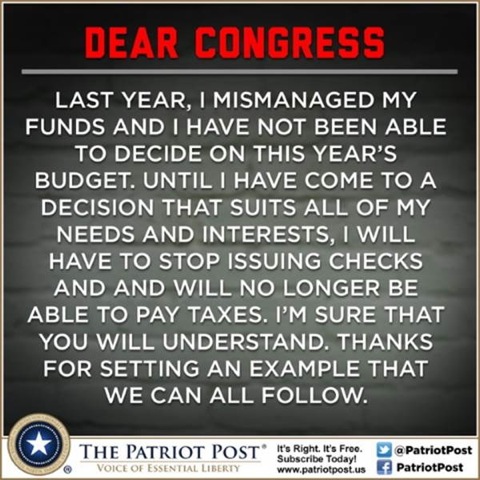The President and congressional leaders have announced a recent spending deal. If acted upon we will see trillion dollar deficits until further notice. Can you say brain dead? This agreement has nothing to do with budgeting. Call it what it is. It is a spending authorization agreement.
The deal…
The deal called the Bipartisan Budget Act of 2019 is a two-year agreement. It raises the discretionary spending caps set in 2011 as part of the Budget Control Act. There is no intention to ever repay the borrowing in this agreement. There is no intention to ever return the federal government paying for what it buys in the current period. Our political leadership grossly, misrepresent the fiscal condition of our bankrupt nation.
The deal ends the last vestige of fiscal responsibility anyone in DC could lay claim to. It is the clarion call of an alarming American future. Americans caring about the nation’s fiscal future and economic prosperity should oppose this. There will be a heavy price for the irresponsibility when the bill comes due. There is nothing conservative about this agreement at all.
What the deal does…
The plan raises the Budget Control Act spending caps by $322 billion over the next two years. National defense gets $172 billion of new spending. Domestic programs get $150 billion of new spending. Higher spending accelerates us to higher spending in subsequent years. It ignores that the higher debt and, in turn, higher interest payments on that debt are the result. It takes America from bad policy to worse policy.
The Committee for a Responsible Federal Budget estimates the real cost of raising the discretionary spending caps at about $1.7 trillion over 10 years. The administration got a measure of certainty for the Pentagon. The 2021 budget level would be a mere 0.3% increase, which represents a loss of real purchasing power after accounting for inflation. This is insufficient for the task. It requires the Defense Department to increase risk in the National Defense Strategy.
What the administration got… what it gave up…
The administration gave away an increase to domestic spending which is wholly inappropriate. Social Security plus Medicare alone account for about $2.2 trillion of annual spending. That’s roughly three times defense spending. Worse yet, many of the domestic programs fall outside the constitutional role of the federal government. Rather than receiving more funding these programs should be cut. If they have support, they should be state programs. We call it federalism.
In addition to the new spending, the spending authorization agreement suspends the debt limit for two years. This is a mistake. The debt limit is too important an issue to be dealt with in the context of a massive spending deal. Reaching the debt limit is intended as a wake-up call. Lawmakers need to confront their irresponsible spending habits.
What should happen…
Burdening future generations with more debt should be a subject of serious national debate. It is not a casual add-on to a spending wish list. Suspending the debt limit is very different than raising it by a specific amount. Doing so gives the federal government a free pass to rack up as much additional debt as it wants; no limit, none.
There is no responsible increase in the debt limit. Responsible would be to first enacting spending cuts and returning to budgeting. Anything else is just taking out another new credit card.
Offsets… really?
The deal contains $77.5 billion in offsets. That is less than a quarter of the new spending. Worse, those nominal offsets are dubious at best. Part of the savings would come from a two-year extension of customs user fees, a gimmick that has been used in each of the last three budget deals. The fee was established to offset the cost of customs inspections.
More recently it’s become a favorite means for Congress to raise unrelated spending. If these fees aren’t needed for their intended purpose, then discontinue them. Pass the savings on to travelers. The deal’s remaining offsets come through extension of the Budget Control Act’s mandatory sequestration preventions.
Hopes and better policy…
Extending the mandatory sequester is better policy. However, it is inadequate to keep up with the discretionary spending increases. Equally troubling is the savings won’t begin to materialize until nine years from now. That’s “never gonna’ happen” in political speak. If lawmakers want to raise the spending caps, then fully pay for it with reforms to mandatory spending programs.
There had been hope for a more responsible path forward. The president offered Democrats a menu of $574 billion worth of offsets to consider. The administration also reportedly proposed extending the Budget Control Act caps. Two more years would save an additional $516 billion. These proposals were scrapped in favor of political irresponsibility.
Balance the budget… Pay down the debt…
Trump was elected in part on his promises to balance the budget. His first budget proposal as president did just that. His two subsequent proposals would have significantly cut spending and reduced the size of the federal government. But putting out good proposals is not going to feed the bulldog. The administration needs to put its weight behind those proposals to get traction.
Agreeing to this budget deal flatly contradicts the policies this administration has put forward. The president has lamented how much the debt grew under the previous administration. But if this spending authorization debt ceiling lifting deal becomes law, his record will be worse. America’s fiscal situation is unsustainable. The Congressional Budget Office has been warning of a budget breakdown for years.
Conclusion:
Lawmakers don’t get it or they just don’t care. This is incredibly shortsighted. The decisions Congress makes today fundamentally impact the lives of future Americans. We, the average Americans, look to Congress for leadership. If lawmakers intend to lead us to a more prosperous and secure future, they must rethink this deal and find a more responsible path forward.
